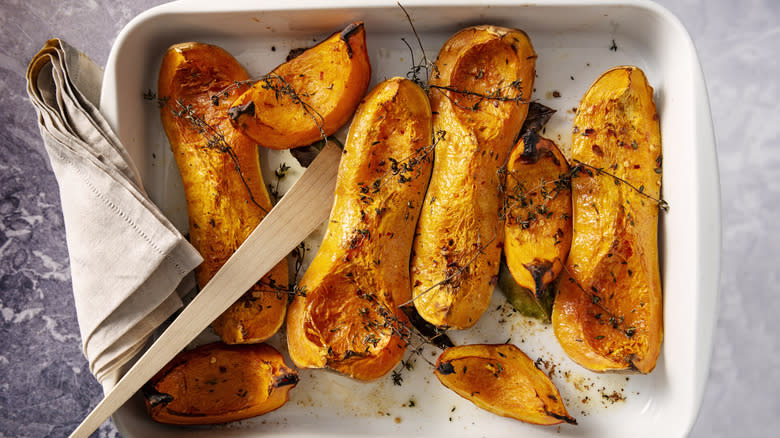Winter Squash Skin Is Edible But That Doesn't Always Mean You Should Eat It

Sweet with a hint of nuttiness, winter squashes are one of the better parts of the colder months, in part because they have the gift of versatility. Every part of a winter squash is edible, from the flesh and seeds down to the exterior. However, that doesn't mean you should always eat winter squash skin.
The interior flesh of winter squashes like butternut, acorn, and kabocha can be used in a multitude of ways. It can be blended into a creamy soup, roasted with smoky spices, or pureed and folded into mashed potatoes. Although edible, the skin doesn't have that same degree of versatility. Depending on the variety, the exterior can be quite tough, making it difficult to eat. With squashes like butternut and kabocha, it's easier to peel off the skin before cooking them since they're thick and sturdy.
When you peel the skins, they can be set aside to later be braised or sauteed. Since the skin is quite chunky, it works best as a side dish or in meals where its chewy texture isn't disruptive. Softened squash skin can be a welcomed addition to roasted vegetables, salads, or pasta, but it won't work well as a soup topping, or mixed into mashed potatoes or risotto.
Read more: 23 Types Of Potatoes And When To Use Them
Do You Always Have To Peel Squash Before Eating?

Even if you're not going to consume the skin, it's not uncommon to cook the squash in its whole state. You can simply cut a butternut squash in half and roast the entire thing, then scoop out the soft roasted flesh from the thick skin after. However, thinner-skinned winter squashes like acorn can be cooked and eaten with the skin left on. Easy baked acorn squash comes together quickly without the hassle of peeling. All you need to do is slice and season it before baking it for 25 minutes. Since the skin is on the delicate side, it'll gently crisp up creating a delicious contrast to the flesh's soft sweetness.
Delicata squash doesn't require any peeling beforehand either. As the name suggests, delicata squash has a supple skin that's cooked quite easily. When sliced, the squash forms curved rings that can be sauteed, causing the skin to soften as the flesh becomes sweeter. Cover the squash in your favorite warming and smoky spices and heat it in olive oil until the flesh begins to brown.
Read the original article on Tasting Table.
